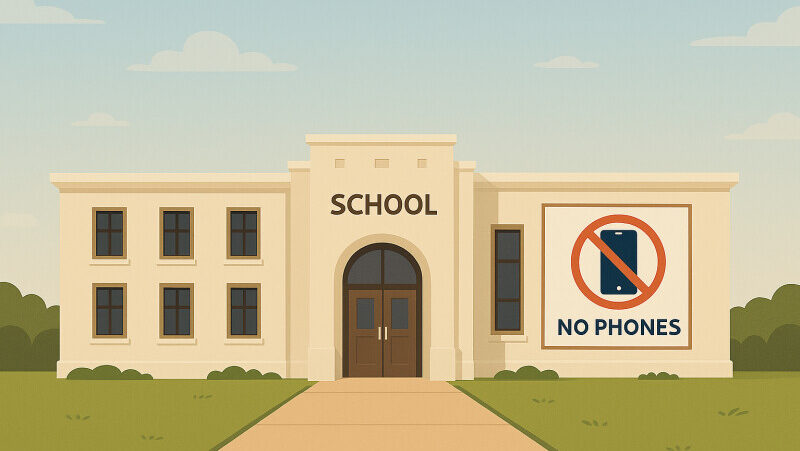A Bold Step for Better Education
In a move that is sparking discussions across the UAE, Abu Dhabi has officially ban the use of mobile phones and smartwatches during school hours. The new policy, introduced by the Abu Dhabi Department of Education and Knowledge (ADEK), aims to improve students’ focus, academic performance, and overall well-being.
The rule applies to all public and private schools in the emirate. Under this policy, students must leave their phones and smartwatches at home or keep them away during the school day. Only specific medical cases or emergency situations will be allowed as exceptions.
This bold step reflects a growing concern among educators and parents that mobile phones are causing more harm than good in the classroom.

Why the Ban Was Introduced
Over the past few years, teachers and parents have noticed a significant drop in students’ attention spans. Many blame this on the constant distraction caused by smartphones. Whether it’s scrolling through social media, texting friends, or playing games, students are finding it harder to focus on lessons.
Research has also shown that students who frequently use their phones during class often struggle with lower grades and increased anxiety. Many children also stay up late on their devices, leading to lack of sleep, mood swings, and poor behavior in school.

By removing phones from the learning environment, ADEK hopes to create a calmer and more focused atmosphere for students to thrive.
Students React with Mixed Feelings
As expected, not all students are happy with the change. Some say their phones help them stay connected to their parents or relieve stress during breaks. Others feel the policy is too strict, especially for older students who may use their devices to check schedules, set reminders, or do research.

However, a number of students agree with the move. One high school student shared, “I think it will be good for us in the long run. Sometimes we don’t even realize how much time we waste on our phones.”
Many students admitted that having no access to phones might push them to talk more with classmates, focus during lessons, and even take part in sports or creative activities during their free time.
Parents and Teachers Support the Change
Many parents have welcomed the decision, saying that it helps set clearer boundaries for children. Several parents shared stories of their kids coming home exhausted after being glued to their screens all day.
One mother said, “My son would check his phone every few minutes, even in class. He was always distracted. I’m glad the school is taking action.”
Teachers, too, have noticed improvements in classrooms where phones were already restricted. Without the buzz of notifications or the temptation to check messages, students are more engaged and willing to participate.
“Learning is becoming active again,” one teacher said. “Students are asking more questions, finishing their tasks, and paying attention.”
Smartwatches Included in the Ban
Interestingly, the ban also covers smartwatches. These devices, though often seen as helpful tools, are also being misused. Students were using smartwatches to send texts, play games, or secretly check social media during lessons.
This detail shows the seriousness of the policy. Authorities want to make sure that no form of digital distraction interferes with the learning process.
Only Exceptions for Medical or Emergency Use
While the ban is strict, ADEK has allowed exceptions in special cases. For example, students with health conditions who need their phones for medical monitoring will still be allowed to carry them. Also, if there’s a genuine emergency, schools will ensure the child can contact their parents.
The aim is not to disconnect students completely from the outside world but to give them a more focused and meaningful school experience.
Schools Will Store Confiscated Devices

Under the new rule, if a student is found using a phone or smartwatch during school hours, the device will be taken away. The school will then store the device safely and return it only to the student’s parent or guardian.
This step is meant to send a strong message. It’s not just a soft rule—it’s one that schools will strictly follow.
The Bigger Picture: A Digital Detox for Young Minds
This decision by Abu Dhabi is part of a larger global conversation about how much screen time is too much, especially for children and teenagers. Across the world, countries are debating the effects of digital devices on young minds.
By making this move, Abu Dhabi is showing leadership in protecting students’ mental health and encouraging real human interaction.
Experts say that this policy might even help improve social skills, creativity, and physical activity among students. When screens are taken away, children often turn to reading, drawing, or playing outdoors—all of which are great for personal growth.
What Happens Next?
For now, all schools in Abu Dhabi are expected to follow the new policy immediately. Teachers and school leaders have received training on how to enforce the rule fairly and how to communicate with parents.
It’s likely that other emirates will closely watch how this policy works in Abu Dhabi. If it proves successful—meaning students perform better, behave better, and feel better—similar bans might be introduced across the UAE.
For parents, it’s a reminder that the school and home must work together. Setting limits on screen time at home will help children adjust to the new rules more easily.
A Healthier Future for Students
In the end, this is more than just a ban on mobile phones. It’s a step toward a healthier, more focused, and balanced school life for every student. With fewer digital distractions, children may finally get the chance to rediscover the joy of learning, connect with others, and grow into more mindful, successful adults.
Also read: UAE Homes Are Getting Smarter – Here’s What’s Driving It












